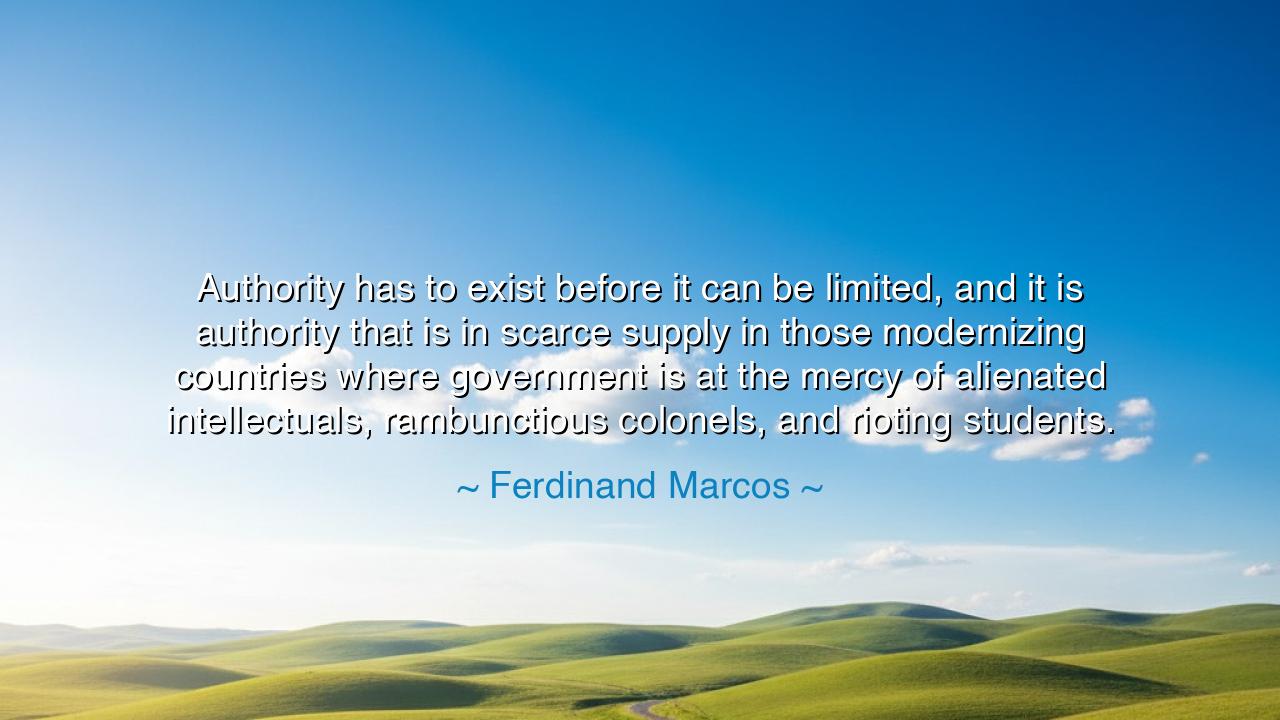
Authority has to exist before it can be limited, and it is
Authority has to exist before it can be limited, and it is authority that is in scarce supply in those modernizing countries where government is at the mercy of alienated intellectuals, rambunctious colonels, and rioting students.






The words of Ferdinand Marcos—“Authority has to exist before it can be limited, and it is authority that is in scarce supply in those modernizing countries where government is at the mercy of alienated intellectuals, rambunctious colonels, and rioting students”—ring with the cadence of both justification and warning. Spoken by a man who ruled his nation with an iron hand, this quote reveals a paradox that lies at the heart of civilization: that power must first be established before it can be restrained, that order must precede liberty, and that without authority, chaos devours the promise of freedom. Marcos, a leader forged in the turbulent years of the twentieth century, spoke these words to defend the necessity of strong governance in times of unrest—but beneath his argument lies a universal truth about the fragile balance between discipline and freedom.
To understand the origin of this quote, one must look to the Philippines during the 1960s and 1970s—a nation torn between tradition and transformation. Marcos rose to power amid the cries of reform and the tremors of instability. The world around him was aflame with change: students marched in the streets, generals schemed in barracks, and scholars questioned the legitimacy of old institutions. The air was thick with both hope and rebellion. It was in this furnace of modernity that Marcos declared his belief that before democracy could flourish, authority must first be secured. Without it, he argued, a nation would be like a ship with no rudder—tossed by every wave of dissent.
In the ancient style, let us contemplate his meaning. Marcos’s words echo the wisdom of philosophers and rulers who knew that freedom without order leads to anarchy, and order without freedom leads to tyranny. The Greeks learned this lesson in their city-states, where liberty decayed into factional violence. The Romans, too, saw their republic crumble when discipline faded and demagogues turned the people’s passions against themselves. In every age, the struggle between liberty and authority defines the fate of nations. For power, like fire, must first be kindled before it can be controlled; without flame, there is no warmth—but uncontained, that same flame will consume all it touches.
Yet Marcos’s quote also bears a shadow. Though he spoke of authority, what followed in his rule was the concentration of power—martial law, censorship, and the silencing of dissent. The very rambunctious colonels and rioting students he condemned were the voices of a generation yearning for justice. His reign serves as a living parable: that when authority becomes absolute, it ceases to be authority and becomes domination. For true authority is not imposed by fear, but earned by legitimacy—by the consent and trust of those who are governed. The authority that builds must be different from the authority that oppresses.
Consider another example from history: Napoleon Bonaparte, who rose amid the chaos of post-revolutionary France. Like Marcos, he believed that only strong authority could stabilize a fractured nation. He restored order, reformed the law, and revived the state—but in doing so, he also crowned himself emperor and chained the liberty that had birthed him. His brilliance gave France glory, but his ambition plunged Europe into war. Thus the lesson resounds across centuries: that authority, though essential, must remain servant to the common good, not master of it.
Marcos’s quote, when stripped of its political armor, speaks to a truth that reaches beyond nations—it applies to families, communities, and the human spirit itself. Every structure, to endure, must have order at its root. A household without guidance falls into disorder; a mind without discipline becomes a prisoner of its passions. Authority, rightly understood, is not the enemy of freedom but its guardian. It is the spine that gives strength to the body of society. But when that spine hardens into rigidity, it breaks. Thus, wisdom lies not in rejecting authority, nor in worshiping it, but in balancing it with justice and compassion.
So, my children of the future, take this lesson from the rise and fall of rulers: authority must exist, but it must also be limited. A nation without it dissolves into chaos, but a nation that worships it becomes a prison. Let your leaders be strong enough to protect, but humble enough to listen. Let your people be free enough to speak, but disciplined enough to build. For a society that fears authority breeds rebellion; a society that fears freedom breeds decay. Between these two extremes lies the harmony that sustains civilization.
Therefore, as Marcos himself unwittingly taught through both his words and his rule: authority is a double-edged gift—a blessing when guided by virtue, a curse when wielded by pride. Guard it carefully. Demand it when your world falls into disorder; restrain it when it grows too proud. For only in the balance between power and principle can a people remain truly free—and only in that balance can the voice of justice endure across the ages.






AAdministratorAdministrator
Welcome, honored guests. Please leave a comment, we will respond soon